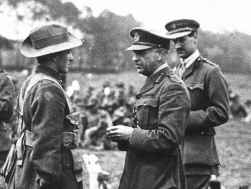 |
Born on 27 June 1865 to
parents of Prussian-Jewish origin. Educated at
prestigious Scotch College and graduated an engineer from
Melbourne University in 1893 and arts/law in 1895. Worked
as an engineer and joined the Garrison Artillery (Army
Reserve). By 1913 he was a colonel and had published 100
Hints for Company Commanders - later
an army-training manual. Sent with the 4th Brigade (1,000
men) to Gallipoli in 1915 where he made a name for
himself for his independent decisions in a bungled
campaign. But even he could not save his brigade from the
futile August/September offensives against the Turks in
that year. By June 1916 he was in France, with the rank
of major-general and in charge of the new 3rd Division
which he trained mercilessly. Once again he used raiding
techniques frowned on by the British High Command, but
his detail and precision in a war that was going very
badly impressed them. By 1917 he was made corps
commander. He trained his troops to a high degree of
efficiency and coordinated the use of infantry, air
power, artillery and tanks. |
| It was at the
Battle of Hamel Hill on 4-July-1918 that his tactics won
a well needed victory for the Allies. On 12-Aug-1918,
Monash was knighted on the field by King George V.
Thereafter the A.I.F. smashed its way through France,
used as shock troops in an amazing series of victories
against the Germans - at Chignes, Mont St Quentin,
Peronne and Hargicourt and breaking the Hindenburg Line. None of the generals at the time
compared with him in intellect, personal magnetism,
management and ingenuity. However, many members of the
British High Command often reminded him that he was a
Jewish colonel with no formal army background. He won the
respect and loyalty of his troops.
|
